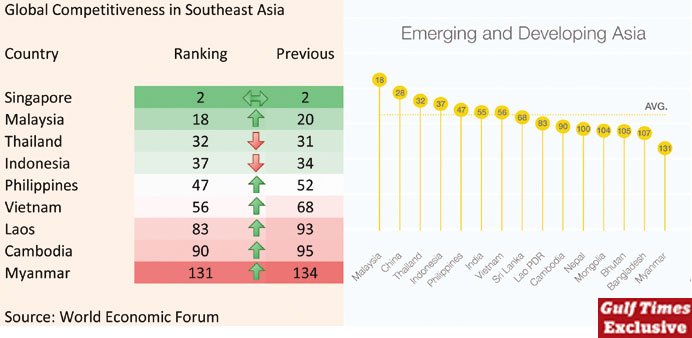By Arno Maierbrugger/Gulf Times Correspondent/Bangkok
Thailand and Indonesia were the two countries in the ten-member Association of Southeast Asian Nations (Asean) that lost out in the new Global Competitiveness Report 2015-2016 released on September 29 by the World Economic Forum (WEF). The report shows Thailand dropping one notch in the ranking, while Indonesia dropped three. Seven other countries in the region – Brunei has not been assessed – gained, most of all Vietnam which a whopping climbed 12 notches. Singapore remained top in the region and a solid world’s second best out of 140 countries assessed.
Thailand keeps having trouble to improve the efficiency of its institutions, along with its infrastructure, and also ranks low in innovation and what the report calls “business sophistication.” It ranks on higher grounds in market size, macroeconomic environment and healthcare. Many analysts also think that the military regime is prolonging political uncertainty and thus plays its part in undermining Thailand’s economic competitiveness. The country has seen a huge drop in foreign direct investment this year as many international companies choose the nation’s neighbouring countries with better business environments. Adding to that, foreign investors withdrew a net $1.2bn from Thai equities in August, the biggest monthly outflow in two years, reflecting the cautious sentiment of the international business community towards the Thai market. Furthermore, the military regime has prevented Thailand from further integration with the world economy. The presence of the junta led to the suspension of free trade talks with the European Union last year which has signalled that as long as the military regime sticks to power there will be no great convergence on the issue.
In the case of Indonesia, poor infrastructure and labour inefficiency have dragged down the archipelago’s competitiveness on the global scale. The country’s ranking fell three spots from last year’s ranking to 37 out of 140 economies, after leapfrogging 16 places in the past two years. Corruption and red tape also remain common problems for businesses in Indonesia, although the report showed that standards have somewhat improved owing to the ongoing fight against corruption. The government also launched a series of economic policy packages this year, which are partially aimed at cutting bureaucracy and improving the overall business climate.
On the upside, the biggest jump in this year’s WEF index was made by Vietnam. The country advanced 12 places to 56, indicating its progress in moving away from an economy driven by unskilled labor and natural resources by transitioning towards an efficiency-driven economy. Vietnam is also strong in higher education and market size, but its most problematic factors for doing business remain poor access to financing, poor work ethic and corruption.
Malaysia moved up two positions to 18, marking the country’s highest ranking since 2005. The report indicates that Malaysia’s competitiveness lies in goods market efficiency and financial market development, single pillars of the survey in which Malaysia is ranked in the top ten at 6th and 9th positions, respectively.
The Philippines climbed five notches 47, after seven notches in the previous year. It got the highest ranking in terms of macroeconomic environment, followed by market size and business sophistication. The country, however, lagged in terms of infrastructure, labour market efficiency and goods market efficiency.
Singapore is a case in its own right. It beat every country but Switzerland globally for the fifth consecutive year. Its competitiveness is broad-based, but the city state’s particular strengths are the efficiency of its goods, labour and financial markets and the quality of its higher education and training system. It also scores strongly for its infrastructure, macroeconomic stability and the transparency and efficiency of institutions. Areas for improvement include a relatively low rate of participation of women in the workforce.
The other three assessed Asean countries, Laos, Cambodia and Myanmar, also climbed up the index, with huge gap to their neighbours remaining, though.

